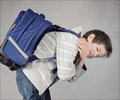A team of neuroscientists at the University of Chicago has found specific brain markers that predict generosity in children.

Decety added that the results of this study demonstrate that children exhibit both distinct early automatic and later more controlled patterns of neural responses when viewing scenarios showing helping and harmful behaviors. It's that later more controlled neural response that is predictive of generosity.
The study shows how young children's brains process moral situations presented in these scenarios and the direct link to actual prosocial behavior in the act of generosity by sharing the stickers.
The results shed light on the theory of moral development by documenting the respective contribution of automatic and cognitive neural processes underpinning moral behavior in children, Decety concluded in the paper.
The developmental scientists found evidence from the EEG that the children exhibited early automatic responses to morally laden stimuli (the scenarios) and then reappraised the same stimuli in a more controlled manner, building to produce implicit moral evaluations.
Decety continued that these findings provide an interesting idea that by encouraging children to reflect upon the moral behavior of others, people may be able to foster sharing and generosity in them, adding that these findings show that, contrary to several predominant theories of morality, while gut reactions to the behavior of others do exist, they are not associated with one's own moral behavior, as in how generous the children were with their stickers.
Source-ANI
 MEDINDIA
MEDINDIA




 Email
Email








